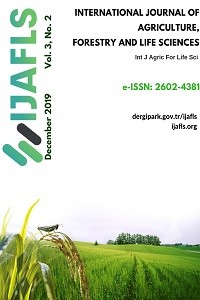Öz
Kaynakça
- Akbaba, U., Şahin, Y., Turkez, H. (2011). Comparison of Element Contents in Figs Grown Under Organic and Conventional Farming Regimes for Human Nutrition and Health. Fresenius Environmental Bulletin, 20(10):2594-2600
- Altındişli, A., Ertem, A. (1998). First International Symposium on Fig. Acta Horticulturae 480:227-232.
- Ciscato, CHP., Gebara, AB., Monteiro, SH. (2009). Pesticide residue monitoring of Brazilian fruit for export 2006-2007. Food Additives & Contaminants Part B-Surveillance, 2(2):140-145, DOI: 10.1080/19440040903330326
- Engebretson, J., Hall, G., Hengel, M., Shibamoto, T. (2001). Analysis of pendimethalin residues in fruit, nuts, vegetables, grass, and mint by gas chromatography. Journal of Agricultural And Food Chemistry, 49(5):2198-2206, DOI: 10.1021/jf010048b
- Erbay, B., Dolgun, O., Ertan, B. (2011). Sensorial and chemical differences between organic and conventional grown figs (Ficus carica L. cv. Sarılop). African Journal Of Agricultural Research, 6(16):3911-3918
- İrget, M.E., Aksoy, U., Okur, B., Ongun, A.Z., Tepecik, M. (2008). Effect of calcium based fertilization on dried fig (Ficus carica L. cv. Sarılop) yield and quality. Scientia Horticulturae, 118(4):308-313
- Ji, X.F., Li, R., Yang, H., Qi, P.P., Xiao, Y.P., Qian, M.R. (2017). Occurrence of patulin in various fruit products and dietary exposure assessment for consumers in China, Food Control, 78:100-107, DOI: 10.1016/j.foodcont.2017.02.044
- Lehotay S. J., (2007). Determination of pesticide residues in foods by acetonitrile extraction and partitioning with magnesium sulfate: collaborative study. Journal of AOAC International, 2007 Mar-Apr; 90(2):485-520.
- Liu, Y., Liu, S., Zhang, Y., Qin, D., Zheng, Z., Zhu, G., Lv, Y., Liu, Z., Dong, Z., Liao, X., Li, X. (2020). The degradation behaviour, residue distribution, and dietary risk assessment of malathion on vegetables and fruits in China by GC-FPD, Food Control, 107, 106754, 10.1016/j.foodcont.2019.106754
- Mordoğan, N., Hakerlerler, H., Ceylan, S., Aydın, S., Yağmur, B., Aksoy, U. (2013). Effect of Organic Fertilization on Fig Leaf Nutrients and Fruit Quality. Journal of Plant Nutrition, 36(7):1128-1137, DOI: 10.1080/01904167.2013.780611
- TÜİK, (2019). https://biruni.tuik.gov.tr/medas/?kn=92&locale=tr (Access Date: 13.11.2019)
Öz
Food production has very important strategy in today’s world. While half the world struggle with famine, the other half wants food stuffs they produce and consume to be secure. When it is said secure food, foods which is not harmful to health, do not contain any physical, chemical and microbiological residues and also of which traceability provided come to mind. Traceability of agricultural products has become the most important issue to provide food security. In organic farming based on traceability principles, pesticide residue analyzes are carried out in the final products and certified if the pesticide problem does not occur in the product. In this study, the pesticide residues on fig fruit, Ficus carica L., grown by organic agricultural methods was examined. The fig trees were grown in İsafakılar village of İncirliova district of Aydın city in Western Part of Turkey. The residue analyses were done by GC-MS/MS and LC-MS/MS chromatographies. 506 active substances in used pesticides during the cultivation period were analyzed by LC-MS/MS chromatography meanwhile 113 active substances of pesticides by GC-MS/MS chromatography device were analyzed in fig fruit. This study was conducted in years of 2017 and 2018 consecutively. Detactable pesticide residues have not been measured in the samples.
Anahtar Kelimeler
Kaynakça
- Akbaba, U., Şahin, Y., Turkez, H. (2011). Comparison of Element Contents in Figs Grown Under Organic and Conventional Farming Regimes for Human Nutrition and Health. Fresenius Environmental Bulletin, 20(10):2594-2600
- Altındişli, A., Ertem, A. (1998). First International Symposium on Fig. Acta Horticulturae 480:227-232.
- Ciscato, CHP., Gebara, AB., Monteiro, SH. (2009). Pesticide residue monitoring of Brazilian fruit for export 2006-2007. Food Additives & Contaminants Part B-Surveillance, 2(2):140-145, DOI: 10.1080/19440040903330326
- Engebretson, J., Hall, G., Hengel, M., Shibamoto, T. (2001). Analysis of pendimethalin residues in fruit, nuts, vegetables, grass, and mint by gas chromatography. Journal of Agricultural And Food Chemistry, 49(5):2198-2206, DOI: 10.1021/jf010048b
- Erbay, B., Dolgun, O., Ertan, B. (2011). Sensorial and chemical differences between organic and conventional grown figs (Ficus carica L. cv. Sarılop). African Journal Of Agricultural Research, 6(16):3911-3918
- İrget, M.E., Aksoy, U., Okur, B., Ongun, A.Z., Tepecik, M. (2008). Effect of calcium based fertilization on dried fig (Ficus carica L. cv. Sarılop) yield and quality. Scientia Horticulturae, 118(4):308-313
- Ji, X.F., Li, R., Yang, H., Qi, P.P., Xiao, Y.P., Qian, M.R. (2017). Occurrence of patulin in various fruit products and dietary exposure assessment for consumers in China, Food Control, 78:100-107, DOI: 10.1016/j.foodcont.2017.02.044
- Lehotay S. J., (2007). Determination of pesticide residues in foods by acetonitrile extraction and partitioning with magnesium sulfate: collaborative study. Journal of AOAC International, 2007 Mar-Apr; 90(2):485-520.
- Liu, Y., Liu, S., Zhang, Y., Qin, D., Zheng, Z., Zhu, G., Lv, Y., Liu, Z., Dong, Z., Liao, X., Li, X. (2020). The degradation behaviour, residue distribution, and dietary risk assessment of malathion on vegetables and fruits in China by GC-FPD, Food Control, 107, 106754, 10.1016/j.foodcont.2019.106754
- Mordoğan, N., Hakerlerler, H., Ceylan, S., Aydın, S., Yağmur, B., Aksoy, U. (2013). Effect of Organic Fertilization on Fig Leaf Nutrients and Fruit Quality. Journal of Plant Nutrition, 36(7):1128-1137, DOI: 10.1080/01904167.2013.780611
- TÜİK, (2019). https://biruni.tuik.gov.tr/medas/?kn=92&locale=tr (Access Date: 13.11.2019)
Ayrıntılar
| Birincil Dil | İngilizce |
|---|---|
| Konular | Ziraat, Veterinerlik ve Gıda Bilimleri |
| Bölüm | Review Papers |
| Yazarlar | |
| Yayımlanma Tarihi | 23 Aralık 2019 |
| Gönderilme Tarihi | 27 Kasım 2019 |
| Kabul Tarihi | 23 Aralık 2019 |
| Yayımlandığı Sayı | Yıl 2019 Cilt: 3 Sayı: 2 |


